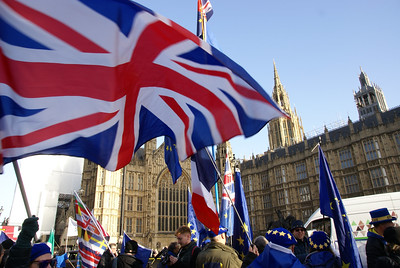It almost seems ironic to suggest that five years on from Britain’s exit from the EU that British politics is increasingly resembling that of its continental neighbours. Yet, in truth, with the rise of the hard-right, the splintering of the two-party system and the emergence of influential regional political figures, the UK’s political landscape is perhaps looking more European than ever.
Far-right fraternity
The rise of the far-right within the EU has been well-documented, with many commentators drawing parallels between Alternative for Germany (AfD), France’s National Rally and Austria’s Freedom Party, amongst others. Each of these parties have echoed similar sentiments in their policy platforms, with anti-immigrant attitudes, Euroscepticism and social conservatism amongst the most significant.
However, these parties are also united in another factor: their success. In Germany, the AfD is the second-largest party in the Bundestag, and France’s National Rally holds a strong position in the French National Assembly, as well as leading in the voting intention polls.
It is somewhat straightforward to draw these same parallels with the UK’s rising hard-right party, Reform UK. Echoing similar positions as their continental compatriots on immigration and social affairs, the party’s small parliamentary delegation sits in contrast to their repeated polling leads.
However, what is perhaps more intriguing is the similarity in strategy between Nigel Farage’s party and other European hard-right groups. Many of Reform UK’s supporters are disillusioned with the mainstream politics of the Conservatives and Labour, with Farage capitalising on this disenchantment in a similar manner to Marine Le Pen in France or Giorgia Meloni in Italy. This has drawn votes away not only from the weakened Conservatives, but allowed Reform to make inroads into Labour’s base of support through an anti-establishment branding.
An end to the two-party system?
However, it is not just on the right where politics seems more European. With both the Labour and Tory parties struggling in the polls, it seems that the dominant players in British politics since the Second World War are increasingly under threat from all sides.
On the left, despite an ongoing crisis involving the leadership of the party, the newly-founded “Your Party” has opened yet another challenge on the government’s left flank. Alongside them, the election of left-wing Zack Polanski has lead to a surge in Green Party membership, while the traditional third party of the Liberal Democrats continue to draw centrist voters from both the Conservatives and Labour.
This increasingly fragmented political system draws British politics increasingly in line with Europe. Amongst many European democracies, in particular in Germany, coalition politics has been a strong theme for decades, aided by proportional representation as well as a broader variety of political parties. If the trends seen in the past year continue, it is certainly not impossible that coalition governance may become in the norm in Britain as well.
Rise of the regions
Whilst the rise of the far-right and the fragmentation of the two-party system may be the most obvious signs of British politics increasingly resembling that of Europe, the rise of influential regional politicians could be a more subtle way the UK is drifting towards a continental style of politics.
The UK has a deeply centralised system of governance, but in recent years the emergence of regional mayors with significant devolved powers have changed the way we think about politics and politicians. This is perhaps best exemplified by Manchester’s own Andy Burnham. Whilst Burnham is currently the Mayor of Greater Manchester, his political influence stretches well beyond the North West, and many in Labour view him as a “king over the water” and future leader of the party.
Through Burnham’s national clout, and the high profiles of other regional mayors such as Sadiq Khan (Mayor of London) and Steve Rotheram (Mayor of Liverpool), it is clear that regional roles can shape the politics of the UK. In this, Britain’s politics may further mirror that of Europe, where regional politicians have traditionally held higher profiles and gone onto higher office; Germany’s former Chancellor Olaf Scholz was formerly the Mayor of Hamburg himself.
Whilst British politics certainly remains distinct in some ways to our European neighbours, whether for better or worse, it seems even Brexit could not prevent the UK’s steady drift towards a more continental style of politics.
